When it comes to managing your business operations effectively choosing the right ERP (Enterprise Resource Planning) system is a game-changer. But with so many options on the market how do you select the one that best aligns with your goals? In this guide we’ll break down key ERP providers comparing their features benefits and drawbacks. Whether you’re a small business or a growing enterprise this article has got you covered.
What is ERP and Why is it Important?
An ERP system integrates core business processes like accounting inventory management customer relationship management and more into one unified system. It eliminates data silos enhances efficiency and provides real-time insights. Simply put ERP helps businesses make better decisions faster.
Some key benefits of ERP systems include:
- Streamlined operations
- Improved data accuracy
- Better decision-making capabilities
- Scalability for future growth
However it’s important to note that ERP systems also come with potential challenges such as high implementation costs and a steep learning curve for employees.
Top ERP Systems Compared
Let’s dive into a side-by-side comparison of the most popular ERP solutions. We’ll cover SAP NetSuite Microsoft Dynamics 365 Odoo and Oracle ERP Cloud.
SAP ERP
Pros:
- Renowned for its robust features and scalability
- Industry-specific solutions tailored for manufacturing retail and healthcare
- Highly customizable to meet unique business needs
Cons:
- High implementation and maintenance costs
- Complex setup process that requires expertise
Ideal For: Large enterprises and industries with specialized requirements
Oracle ERP Cloud
Pros:
- Cloud-based platform for flexibility and scalability
- Strong financial and accounting capabilities
- AI-powered analytics for advanced decision-making
Cons:
- Steep pricing for smaller businesses
- Limited customization compared to competitors
Ideal For: Medium to large enterprises with a focus on finance
Microsoft Dynamics 365
Pros:
- Seamless integration with Microsoft Office and Azure
- User-friendly interface
- Scalable for small to large businesses
Cons:
- Add-ons can quickly increase costs
- Limited industry-specific features
Ideal For: Businesses already using Microsoft’s ecosystem
For more details on Microsoft Dynamics 365 ERP, visit our dedicated page.
NetSuite ERP
Pros:
- Comprehensive cloud-based ERP system
- Built-in e-commerce and CRM modules
- Scalable for growing businesses
Cons:
- Can be expensive for smaller organizations
- Long learning curve for users
Ideal For: Fast-growing companies and enterprises with global operations
Odoo ERP
Pros:
- Open-source and highly customizable
- Affordable pricing for small businesses
- Large community for support
Cons:
- Limited advanced features compared to competitors
- May require significant technical expertise for setup
Ideal For: Small to mid-sized businesses seeking a flexible ERP solution
For more information on Odoo ERP, visit our detailed guide.
People Are Always Asking
What is the best ERP for a small business? Odoo ERP is often praised for its affordability and customization options making it a great choice for small businesses. However Microsoft Dynamics 365 also offers scalability and ease of use.
Can ERP systems be used for non-profits? Yes many ERP systems like NetSuite have solutions tailored for non-profits helping them manage donors and streamline operations.
Is an on-premise or cloud ERP better? Cloud ERP solutions like Oracle ERP Cloud offer flexibility and scalability whereas on-premise systems may provide more control but come with higher maintenance costs.
Tamer Badr’s Perspective
“Choosing the right ERP isn’t just about the software; it’s about finding a partner that understands your business needs. At Singleclic we believe in aligning technology with strategy. That’s what sets businesses apart.” — Tamer Badr Founder of Singleclic
For more insights visit our ERP Services page to explore how Singleclic can guide your ERP journey.
ERP Implementation Challenges to Watch Out For
While ERPs offer immense value implementation can be challenging. Common issues include:
- High upfront costs: Even affordable options like Odoo can add up with customizations
- Change management: Employees need training to adapt to new systems
- Integration hurdles: Ensuring the ERP works with existing tools can be tricky
To minimize these risks consider partnering with an experienced ERP consultant.
Reviews of Popular ERP Systems
SAP ERP: Users love its extensive features but many complain about the complexity of implementation.
Oracle ERP Cloud: Highly rated for finance features but some feel it lacks sufficient customization.
Microsoft Dynamics 365: Praised for its user-friendly interface though its add-ons can make it costly.
NetSuite: Globally favored by enterprises yet smaller businesses struggle with its pricing.
Odoo: Appreciated for its flexibility but criticized for requiring technical expertise.
Why Choose Singleclic for ERP Services?
At Singleclic we specialize in delivering tailored ERP solutions to meet your unique business needs. From consultation to implementation we’re here to ensure a smooth transition. Learn more about our ERP services.
Conclusion
Selecting the right ERP system is a crucial decision that impacts every aspect of your business. While SAP and Oracle cater to large enterprises Microsoft Dynamics and NetSuite provide scalable solutions for mid-sized organizations. Small businesses can benefit from the affordability and flexibility of Odoo. Whatever your choice ensure it aligns with your goals and budget.
“An ERP system isn’t just software it’s a strategic investment in your future” says Tamer Badr. For expert guidance and a partner who understands your vision contact Singleclic today.
FAQs
Start by identifying your business needs considering factors like budget scalability and industry-specific requirements.
Implementation time varies but typically ranges from 3 to 12 months depending on the system and business size.
Most modern ERP systems offer robust security features especially cloud-based solutions like NetSuite and Oracle ERP Cloud.
When comparing ERP systems, it’s essential to evaluate features like scalability, integration capabilities, ease of use, industry-specific modules, and reporting tools. By conducting an ERP feature comparison, you can ensure the chosen solution meets your business requirements.
To compare ERP systems effectively, create a checklist of your business needs and assess each system’s functionality, customization options, and vendor support. Using an ERP system comparison guide can help streamline the process.
An ERP pricing comparison should include initial licensing fees, implementation costs, customization expenses, and ongoing maintenance or subscription fees. Don’t forget to factor in the cost of cloud ERP solutions versus on-premise systems.
Start by identifying your company’s needs, then compare ERP solutions based on scalability, deployment options (cloud vs. on-premise), user reviews, and ROI. A comprehensive ERP comparison guide can provide further insights.
A cloud ERP comparison is crucial as more businesses transition to cloud-based solutions. Assess factors like data security, accessibility, integration capabilities, and cost-effectiveness to determine the best cloud ERP product for your business.










